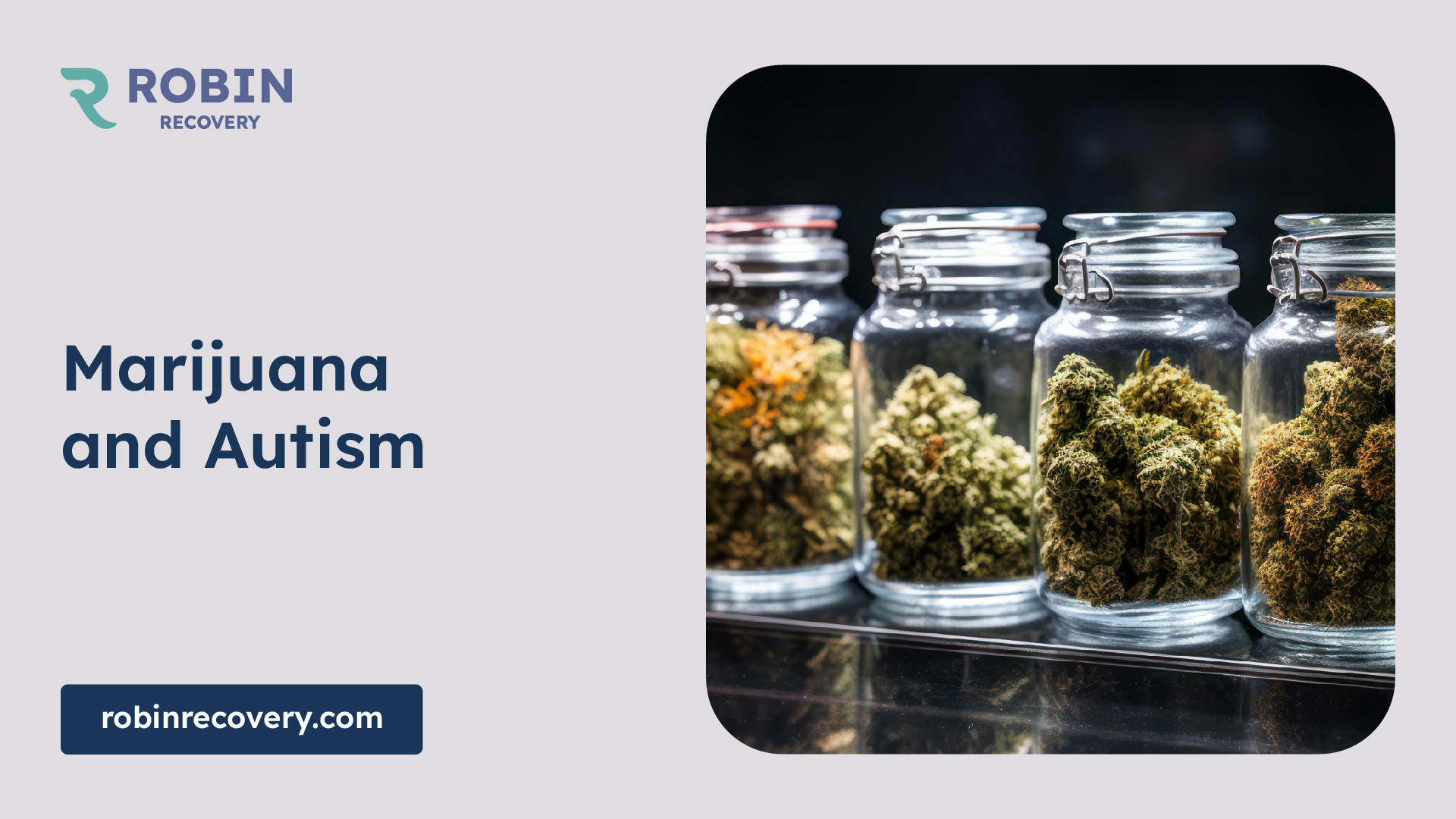Marijuana and Autism

Cannabis and Autism Spectrum Disorder
The potential therapeutic effects of cannabis and its derivatives on autism spectrum disorder (ASD) represent a burgeoning area of research and interest. The intersection of marijuana and autism carries implications for symptom management, requiring careful analysis and consideration.
Symptom Improvement with Cannabis
In the context of ASD, several studies have indicated that cannabis products may reduce the number and/or intensity of various symptoms. These symptoms include hyperactivity, self-harm, anger, sleep problems, anxiety, restlessness, psychomotor agitation, irritability, persistent aggression, and depression. Additionally, individuals with ASD have reportedly shown improvements in cognition, sensory sensitivity, attention, social interaction, and language upon the administration of cannabis products [1].

Moreover, there is evidence to suggest a potential role of the endocannabinoid system in autism. Changes in this system may be prevalent in individuals with autism, and substances derived from Cannabis sativa, such as CBD, could modulate different aspects related to ASD, including neuronal plasticity, cognition, and social interaction [2].
Need for Clinical Trials
Despite initial indications of the potential benefits of cannabis for ASD symptom management, there remains a critical need for more extensive clinical trials. While some research has pointed towards positive outcomes, the current body of evidence is largely anecdotal or based on limited studies. Rigorous, comprehensive, and controlled clinical trials are necessary to validate these findings, assess the safety and efficacy of various cannabis products, and delineate the mechanisms through which these substances exert their effects.
Further research in this area will not only contribute towards a more nuanced understanding of the complex relationship between marijuana and autism but will also support the development of targeted therapeutic strategies for individuals with ASD, potentially improving their quality of life and overall well-being.
Cannabis Products for Autism
In recent years, there has been a growing interest in the potential of cannabis products as a treatment for various symptoms associated with Autism Spectrum Disorder (ASD). The primary focus is not only on symptom management, but also on the possible cognitive and behavioral improvements that cannabis products may offer to individuals with ASD.
Effects on Cognition and Behavior
Several studies indicate that cannabis products can reduce the number and/or intensity of various symptoms associated with ASD. These symptoms include hyperactivity, attacks of self-mutilation and anger, sleep problems, anxiety, restlessness, psychomotor agitation, irritability, aggressiveness, perseverance, and depression [1].
Additionally, cannabis products have shown potential for improving cognition, sensory sensitivity, attention, social interaction, and language in individuals with ASD. Moreover, research suggests that CBD, one of the active components of cannabis, can relieve symptoms such as spasticity, pain, sleep disorders, and anxiety, and may improve mobility and relieve anxious symptoms and social phobia.
Despite these promising results, it is crucial to note that the studies conducted so far are preliminary. More rigorous research is necessary to validate these findings and to understand better the effects of cannabis products on cognition and behavior in individuals with ASD.
Side Effects and Adverse Reactions
While some studies have highlighted the potential benefits of cannabis products for individuals with ASD, it's also essential to consider possible side effects and adverse reactions. Like all substances, cannabis products may cause side effects, which can vary from person to person and depend on factors such as the specific product used, dosage, and the individual's overall health.
Some common side effects reported with cannabis use include dry mouth, dizziness, fatigue, and changes in appetite or mood. More serious side effects can include nausea, vomiting, hallucinations, and withdrawal symptoms in heavy users.
Given the potential for side effects, it's important for individuals considering cannabis products for ASD to consult with a healthcare provider. This can ensure that they are aware of all potential risks and benefits, and that they use these products safely and effectively.
More research is needed to fully understand the effects and safety of cannabis products for individuals with ASD. While the initial findings are promising, a careful and cautious approach is necessary until more robust evidence is available.
Cannabinoids in Autism Treatment
Investigating the use of cannabinoids in autism treatment is an emerging area of scientific research. Cannabidiol (CBD), a key component of cannabis, has shown potential for therapeutic effects in individuals with Autism Spectrum Disorder (ASD).
Therapeutic Potential of CBD
CBD is one of the cannabinoids found in the cannabis plant that has gained clinical relevance, primarily due to its non-psychoactive properties as compared to its counterpart, THC [3].
A number of studies indicate that cannabis products, particularly those high in CBD, can reduce the number and/or intensity of various symptoms associated with ASD. These symptoms include hyperactivity, self-mutilation, anger, sleep problems, anxiety, restlessness, psychomotor agitation, irritability, aggressiveness, and depression. In addition to symptom reduction, improvements were observed in cognition, sensory sensitivity, attention, social interaction, and language in individuals with ASD.
Moreover, CBD can alleviate additional symptoms associated with ASD, such as spasticity, pain, sleep disorders, and anxiety. It may also improve mobility and relieve anxious symptoms and social phobia [2].
Clinical Studies and Safety Concerns
While the therapeutic potential of CBD for autism treatment is promising, it is essential to emphasize the need for further research. Randomized, blind, placebo-controlled clinical trials are necessary to provide clarity on the effects of cannabis and its cannabinoids in individuals with ASD.
It's also important to consider the endocannabinoid system, which plays a crucial role in the body's physiological processes. Anandamide, a naturally occurring endocannabinoid, is often studied in relation to autism due to its potential imbalances associated with the disorder [3].
In conclusion, while evidence suggests that CBD and other cannabinoids have potential therapeutic benefits for individuals with ASD, it is crucial to approach this treatment avenue with caution. Until more definitive research is conducted, individuals considering cannabis products for ASD treatment should consult with healthcare professionals to weigh potential benefits against possible risks.
Cannabis Use and Autism Risks
While cannabis may offer some therapeutic potential for individuals with autism spectrum disorder, there are also significant risks associated with its use, particularly concerning the vulnerability to psychotic effects and potential epigenetic effects that can be inherited.
Vulnerability to Psychotic Effects
Autistic individuals show vulnerability to the pro-psychotic effects of cannabinoid exposure. This exposure can lead to an increased risk of psychosis that may be passed on to their children [4]. This supports the concept of an overlapping and developmental trajectory between autism and psychosis.
Furthermore, cannabis use can increase the risk of impaired learning and memory recall, and the development of full-blown psychosis. Therefore, while some individuals may seek the potential benefits of marijuana use for autism symptoms, it's crucial to understand these serious risks.
Epigenetic Effects and Inherited Risks
In addition to the increased vulnerability to psychotic effects, cannabis exposure among autism spectrum individuals can have disruptive epigenetic effects. These effects can be intergenerationally inherited in brain areas involved in schizophrenia.
Specifically, autism candidate genes may exhibit bivalent chromatin markings due to cannabinoid-induced epigenetic effects. This makes them more susceptible to subsequent disruption and potentially leading to psychosis later in life [4].
In conclusion, while the use of cannabis may show potential benefits for symptom management in autism, the associated risks cannot be overlooked. These include significant vulnerability to psychotic effects and potential for intergenerational inheritance of disruptive epigenetic effects. Therefore, ongoing research, careful consideration, and medical consultation are crucial in the context of marijuana and autism.
Cannabis Usage Worldwide
The use of cannabis, particularly as a recreational substance, has widespread implications in various areas of health. This section discusses the statistics of recreational cannabis use and the legal status of cannabis, along with related health implications. This analysis is particularly relevant when considering the intersection of marijuana and autism.
Recreational Cannabis Statistics
Cannabis is the most used recreational substance worldwide among adolescents, according to NCBI. Early, more frequent, and/or continuous high-potency cannabis exposures are associated with an augmented likelihood of developing subtle psychotic symptoms or first-episode psychosis. The use of cannabis in adolescence can have detrimental effects on brain maturation, especially during the pubertal period.
Legal Status and Health Implications
While the legal status of cannabis varies worldwide, its use, particularly high THC cannabis, is linked to an increased risk of developing full-blown psychosis. This risk is particularly pronounced in individuals with autism spectrum disorders (ASDs). Autism and psychosis share common neurobiological underpinnings, with psychotic symptoms often resembling manifestations in ASDs, such as impaired social-communicative skills, repetitive stereotyped behaviors, and perceptual abnormalities.
Autistic individuals show vulnerability to the pro-psychotic effects of cannabinoid exposure, which may be transmitted to their progeny. This exposure can produce disruptive methylation effects involving several neurodevelopment- and autism-related genes. Altered methylation patterns can be intergenerationally inherited in brain areas critical to schizophrenia pathophysiology.
As such, psychiatrists should consider extending the "at-risk mental state" paradigm for psychosis to individuals with ASD due to the risk of psychosis among ASD individuals and its cannabis-induced amplification effect. Mental healthcare professionals should caution against recreational cannabis use in ASD adolescents and youth, as excessive THC exposure could precipitate progression from ASD to a major psychiatric disorder. (NCBI)
It is clear that while cannabis use is widespread, its implications for individuals with autism are significant and warrant careful consideration. Further research and clinical trials are necessary to fully understand the impact of cannabis on this population.
References
[1]: https://pubmed.ncbi.nlm.nih.gov/34043900/
[2]: https://www.ncbi.nlm.nih.gov/pmc/articles/PMC9887656/
[3]: https://www.psychiatrictimes.com/view/medical-marijuana-for-autism
